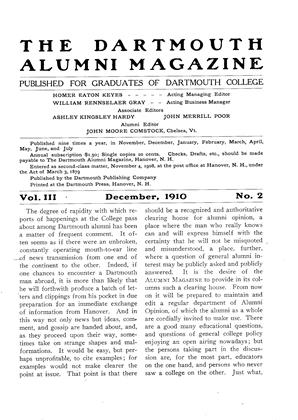About a week before the prospective freshman enters one of our New England colleges, he receives a note from a senior asking him to meet with him immediately on his arrival in town and be initiated into the mysteries of matriculation, be taught the names of the dormitories and recitation halls, and warned fraternally against such excesses as he may be tempted to experiment in. The senior is the freshman's "Big Brother."
In Dartmouth a somewhat similar plan, but of a much wider scope, is in operation this year for the first time, in the Advisory System. Instead of a "Big Brother" in the senior class, each freshman is assigned to some member of the faculty who stands to him "in loco parentis." To him the freshman reports soon after matriculation. He tells his adviser a not inconsiderable part of the story of his life, and much that he does not tell the adviser is able to divine from his silence. He also tells him what his purpose was in coming to College in general, and to Dartmouth in particular. If he has no purpose the adviser tries to suggest to him a worthy one. He talks over with his adviser his course of study and receives and often acts upon advice as to how this course may be improved for the end in view.
Besides this there is a multitude of things that the freshman may and does consult his adviser about. Matters of health, college activities outside of his studies, fraternities, opportunities for self-support, and many other matters trivial in themselves but important to the undergraduate mind.
The relation between adviser and student is designed to be primarily social and friendly, as that must be the basis if definite results are to be obtained. The adviser expects his "advisee" to use his services freely and voluntarily. He expects the student to meet him at stated intervals and between these interviews whenever he wants advice or help of any kind. The relation exists formally for two years, and after that it is more than likely to continue in the form of true friendship.
While the system certainly presents difficulties of execution, it gives promise of large results. It is just as true in the educational world as elsewhere that a friend commands one's best services. So it is hoped that when relations between adviser and student are what they should be, the student will be ashamed to present to his adviser anything but his best work. It is hoped that this system may bridge the seemingly impassable gulf between faculty and student, that more students may be inspired with a real love of scholarship for its own sake, that more students may be saved from the slough of delinquency by a timely word of advice, and that the freshman may get as fair a start as possible in the early days of his college course. If only one of these objects is accomplished the system will have proved its right to exist.
 View Full Issue
View Full Issue
More From This Issue
-
 Article
ArticleTHE DIARY OF WILLIAM SMITH
December 1910 -
 Article
ArticleHonor Night
December 1910 -
 Article
ArticleFootball
December 1910 -
 Article
ArticleFootball
December 1910 -
 Article
ArticleThe degree of rapidity with which reports
December 1910 -
 Article
ArticleEdward K. Hall's Services to Dartmouth—Resolutions by the Athletic Council
December 1910
Article
-
 Article
ArticleALUMNI AND TRANSFERS AT TECH FORM DARTMOUTH CLUB
January 1921 -
 Article
ArticleFELLOWSHIPS ON GUGGENHEIM FOUNDATION AVAILABLE
April, 1925 -
 Article
ArticleFaculty and Friends
March 1950 -
 Article
ArticleAids Retarded. Children
February 1952 -
 Article
ArticleA Wah Hoo Wah for –
JANUARY 1964 -
 Article
ArticleDoin’ What ’E Luvs
December 1990 By H.K.

